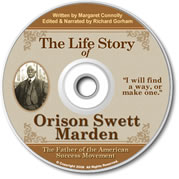- Home
- Self Growth Library
- Orison Swett Marden Chapter XXIV
Orison Swett Marden Chapter XXIV
His Views On Religion
The Life Story of Orison Swett Marden Chapter XXIV:
A question that was frequently asked by readers of his magazine and of his books was: "What are Doctor Marden's religious views?" "Is he New Thought, Christian Science, Theosophist, Unitarian, Spiritualist?"
Dr. Marden was none of these. In his later manhood he bore no church label, subscribed to no particular creed or religious cult. He found good in all of them, but refused to be bound within the limits of any particular one.
He believed in the fatherhood of God and the brotherhood of man. Christian, Jew, Muslim, Buddhist, Atheist, Agnostic, — they were to him all God's children, and as such, his brothers.
If they were sincere in their various beliefs and made the Golden Rule their rule of conduct, they were all traveling Godward in Marden's opinion.
One instance will show what his own idea of the practice of the Golden Rule involves. When the controversy over Christian Science and its founder, Mary Baker G. Eddy, was at its height, a leading New York periodical began to publish, in monthly installments, a biography of Mrs. Eddy.
Her followers resented the publication, claiming that it was not a truthful representation of their leader, and threatened to bring suit for libel against the publishers. Doctor Marden received many letters on the subject and decided to throw open the pages of Success to the defenders of Mrs. Eddy.
He was warned not to do this. It was represented to him that such a course would antagonize readers who were opposed to Christian Science and its founder. The editor was fully aware of this, but insisted that "the other side" should get a fair hearing. Thereupon a short series of articles, written by leading members of the Christian Science Church, presenting their views on Mrs. Eddy, appeared in Success.
The expected happened. Letters from subscribers poured in on the editor, who, they supposed, must be a Christian Scientist, and many canceled their subscriptions. This did not trouble him in the least. He had obeyed the Golden Rule. That was all that mattered.
Whatever the results, he would square the editorial policy of his magazine with his conscience, not with the cash register of the business department.
His views on religion, his thoughts on life, death, and the hereafter, are outlined in the following articles from his own pen. They were prepared only a short time before his departure for California.
The first of these, "The Rediscovery of God," which appeared in Success in March, 1924, was written when the noted Baptist minister, Harry Emerson Fosdick, was on trial for heresy, and the Modernist-Fundamentalist controversy was violently agitating the Christian Church in the United States.
The second, "The Message of Easter," an editorial for the Easter edition of Success, was published in April, 1924, after the writer had entered that "new and fuller life," of which he wrote with such profound conviction.
The third and last article, the last which came from his pen, "The Great Adventure," — appeared in the December issue of the same year, 1924. It gives the impression of having been written under the very shadow of the Great Reaper, as if the writer already saw beyond the veil that separates Time from Eternity.
THE REDISCOVERY OF GOD
Out of the bondage of man-made creeds,
Into the Religion of Noble Deeds;
Out of sectarian bigotry,
Into the Church of Humanity!
There is nothing new or alarming in the passionate controversy over creedal dogmas now raging in the Church. The conflict between the Old and the New is as old as civilization. It will never cease, for it is a condition of progress.
Every forward step on the physical plane — every discovery of Science, — every invention for the easing of hard conditions and for the benefit of the race in the past, — has been opposed as a dangerous innovation and a menace to the established order.
The new thought of God and the old thought of God are as opposite as the poles. In the dim past, for thousands of years, primitive man groped after his God, finding him in the thunder and in the lightning, in the earthquake and the hurricane, in droughts and in floods, in all the mysterious forces of nature that terrify and destroy. They worshipped him in the sun and in the moon, in the mountains and in the sea.
Later, in the development of the religious sense, the theologians located God in a far-off heaven, as a giant man, with all of man's passions, all of his weaknesses and prejudices, all of his hates and bigotries. They represented man as a separate unit, thrown off by this enlarged human God, with all vital connection with him severed.
For centuries they pictured God our Father as an absentee God, as something entirely outside of ourselves, and held that only by certain formal acts of pleading and supplication is it possible to get in touch with Him, get Him to listen to our prayers, or to assist us in any way, whatever.
They called Him a just and loving God; they pictured Him as an unjust and vengeful God, loving only his friends and hating his enemies just as men do. They taught that human beings had been banished from his presence because of a sin committed by their ancestor, and pictured them at his feet, vainly begging for mercy until his only begotten Son came down to earth and gave up his life in atonement for the sin of the first man.
The great Eighteenth Century divine, Jonathan Edwards, one of the ablest and most consecrated clergymen of his day, has left us in his sermons and writings a faithful presentation of the conception of God held even when I was a boy. In his famous sermon, "Sinners in the Hands of an Angry God," he says to his congregation:
"All of our strength, our stability, our power to overcome difficulties, has grown out of our struggles, has been developed by our apparent defeats."
- O.S. Marden
"The God that holds you over the pit of hell, much in the same way as one holds a spider, or some other loathsome insect over the fire, abhors you, and is dreadfully provoked; his wrath towards you burns like fire; he looks upon you as worthy of nothing else but to be cast into the fire; he is of purer eyes than to bear to have you in his sight; you are ten thousand times more abominable in his eyes than the most hateful, venomous serpent is in ours."
Picturing the horrors of hell in another sermon, "Punishment of the Wicked Unavoidable and Intolerable!" he says:
"We can conceive but little of the matter; but, to help your conception, imagine yourself to be cast into a fiery oven, or a great furnace, where your pain would be as much greater than that occasioned by accidentally touching a coal of fire as the heat is greater."
"The world is a colossal university, and no matter how far removed you may be from great institutions of learning, if you are alert and eager to learn you can always absorb something from your environment. We are all in God's great kindergarten, where everything is trying to teach us its lesson."
- Orison Swett Marden
Orison Swett Marden Chapter XXIV , continued...
"Imagine also that your body were to lie there for a quarter of an hour, full of fire, and all the while full of quick sense; what horror would you feel at the entrance of such a furnace! And how long would that quarter of an hour seem to you! And after you had endured it for one minute, how overbearing would it be to you to think that you had to endure it the other fourteen! But what would be the effect on your soul if you knew you must lie there enduring that torment for twenty-four hours!"
"And how much greater would be the effect if you knew you must endure it for a whole year; and how vastly greater still if you knew that you must endure it for a thousand years! — O, then how would your hearts sink if you knew that you must bear it forever and ever! - that there would be no end, that, after millions of millions of ages, your torment would be no nearer to an end, and that you never, never should be delivered. But your torment in hell will be infinitely greater than this illustration represents."
This was the sort of sermon I used to hear every Sunday when I was a boy. Ministers felt it was their duty to picture in the most frightful manner possible the horrors of eternal punishment.
Those terrible pictures of the "lake of fire" in which "lost souls" suffered tortures forever and forever with no respite, without hope of redemption, were burned into my very soul. Many a night, for years, I would cry myself to sleep for fear that I had committed the unpardonable sin, and that I, too, might burn in hell for all eternity.
The picture of the Eternity of the damned was indelibly stamped on my mind by a favorite illustration of the theologians of that time. I often heard our minister give it. "If," he would say, "at the moment of a soul's entrance into hell, a little bird were to begin to carry away our entire earth, one grain of sand at a time, to a distant planet, trillions of miles away, when it had taken away the last grain of the earth, the punishment of that 'lost soul' would be only beginning!"
The picture of the angry, jealous, revengeful God of the Old Testament, who rewarded his friends and punished his enemies, was so burnt into the Puritan consciousness, that there was no room left for that of the New Testament, the tender, merciful, loving God, our Father, presented to us by the Christ his Son, a God who bears no relation to the cruel, vengeful Deity of the Old Testament.
It was the stern, relentless lawgiver, the absentee God, the God who exacted "an eye for an eye and a tooth for a tooth" that clergymen preached and that their congregations worshipped in fear and trembling. Such preaching drove many people to despair of ever placating this angry God who hurled his vengeance upon them from his distant throne, somewhere beyond the clouds.
It was listening to sermons on everlasting punishment that caused Robert Ingersoll, when only eight years old, to revolt against the teachings of the Church and to question the "infallibility" of the Bible. On one occasion, after listening to lurid descriptions of eternal damnation, he said, "If that is God, I hate him." None but God himself will ever know how many sensitive souls have been driven not merely out of the Church, but away from Him, by sermons of the Jonathan Edwards type.
Man's religion, like himself, is an evolution. As he slowly and painfully evolved from his primitive state, he exchanged the god of the thunder and lightning for other gods, idols made of wood and stone, and so on down through the ages to our own time. Only now, after centuries of terrible suffering and wanderings in the wilderness of false beliefs, are we beginning to rediscover the true God revealed by Christ two thousand years ago.
So completely has our conception of God changed, even since Jonathan Edwards preached in New England, that it would be impossible to imagine any clergyman today getting up in his pulpit to tell intelligent, thinking men and women, as he told his people, that "the vindictive justice of God is a glorious attribute," and that "the glory of this attribute appears in the everlasting destruction and ruin of the barren and unfruitful." That "it would not become the glory of God's majesty to show mercy to you, so sinful and vile a creature, for anything that you have done; for such worthless and despicable things as your prayers, and other religious performances:" — that, "he will show mercy only on Christ's account, and that according to his sovereign pleasure, on whom He pleases, when He pleases, and in what manner He pleases"... and that, "He intends to magnify Himself exceedingly in sinking you down in hell."
"Put the great emphasis on doing good living here and now, in this world, not in the next."
It was the belief in this sort of God that caused the warring sects of Christianity to burn men at the stake, to hang, to imprison and torture them to death, to commit all sorts of cruelties in his name for daring to do what men everywhere in the Christian world, both clerical and lay, are doing today, — thinking their own thoughts of God, and refusing to subscribe to certain dogmas or ancient beliefs which their reason and the demonstrations of science reject.
The early Christians, who got the doctrine of Christ from the lips of the apostles who had walked with him in Galilee, had the true conception of God and Christianity.
Their God was a God of love; their religion was a religion of love and service, the religion of "the Fatherhood of God, the brotherhood of man, and the leadership of Jesus Christ."
As the New Testament tells us, they heard the Word gladly, and they lived together in the bonds of brotherly love, sharing their possessions with one another. It was the subtlety of dogmatic theology that caused the first dissensions in the Church.
The supreme thought of Jesus, the Son of Man and the Son of God, was to impress upon man his divinity, his oneness with his Maker, his greatness and his vast possibilities as a son of God, co-heir with him to the kingdom of heaven. He tried to show his disciples that his kingdom of heaven is not in some far distant place, but that it is within men.
He told them that, if they would only have faith in the God power within them, they should do even greater things than he, Jesus himself, had done. These things, however, were not emphasized by the theologians. They put the great emphasis on evil, or sin. This they developed into a monster personality, — Satan, or Devil — a hideously malicious being almost as powerful as God himself who was supposed to be forever engaged in thwarting God's plans, and often came near doing it. They dwelt upon the fear rather than the love of God.
They did not stress the fact that God, the kingdom of heaven, is within us, as the Christ did, because they didn't believe it. The great burden of their teaching was not Christianity, but theology.
Christ taught a religion of joy and gladness. There is no gloom in it, no threat for those who do not accept his teachings. He told man how to get peace and real happiness in this life. He put the great emphasis on living here and now, in this world, not in the next.
The theologian taught a religion of gloom and sadness, a religion of fear instead of love, a religion which put the great emphasis on the future life, in the world beyond the grave. He obscured even the very plain and simple statement of the Christ, "God is a spirit, and they that worship Him must worship Him in spirit and in truth," and made God a great human potentate, a mighty, stern ruler of the Dark Ages.
One of the most unfortunate things that ever happened to the Christian world was the dropping of one of the o's out of Good, making the word God instead of Good, which in some twenty-five different languages always meant the same thing. Both words come from the same root, and have the same identical meaning today. The word God has been misinterpreted to suggest form instead of Spirit, — to teach people to think of God as a person instead of Spirit or Principle, — the eternal principle of good.
The different creeds in every age have built up all sorts of meanings, shapes, forms, and attributes to fit in with the word God when it simply means the everlasting changeless Principle of Good.
Away back in the Dark Ages, when man was steeped in superstition and ignorance, when he was worshipping gross idols under the name of gods, the word God suggested anything to their minds but the spirit of good. They clothed it with all sorts of barbarous attributes associated with their idols.
Had the word Good been retained, this confused and utterly false ideal of the Christian God could never have been substituted for the Christ ideal, or for the simple Bible definition of God, which is Love, — "God is Love."
It would have meant only one thing to everybody, that which is the opposite of the bad, of all that is evil and harmful. It would have been understood, as the synonym for all that is beneficial, glorious, sweet, and beautiful. Its meaning could never have been distorted into the very opposite of what it is, as the word God has been in every age; and we should not have more than two hundred and fifty different religious sects, as we have today.
When Christ said, "He who hath seen me hath seen the Father," he gave the world a new picture of the Father. His own personality, his own character, was a living interpretation of the Spirit that is God.
Who could imagine the gentle, loving Christ, the tender, self-sacrificing "Big Brother," who was always helping somebody, comforting the stricken and sorrowing, uplifting the fallen, bringing peace and hope to the sinner, healing the sick, feeding the hungry, befriending the friendless, yet wielding a power so mighty that he raised the dead to life and made the winds and the waves obey him, — who could imagine this gentle, this divinely beautiful, all-powerful personality bearing any relation to the terrible God of the Old Testament?
Who could imagine the merciful Christ, of whom the prophet Isaiah said, "A bruised reed shall he not break, and the smoking flax shall he not quench," dividing the waters of the Red Sea to let the Israelites pass over to the other side, and then closing the waters over the pursuing Egyptians, who were but obeying the commands of their ruler, Pharaoh! Who could imagine him sending terrible plagues to kill people, to destroy their cattle and crops.
The God we worship today doesn't do things in that way. He has no favorite children. He doesn't punish one and reward another. He judges no one, condemns no one, punishes no one. We punish and reward ourselves, — make our own heaven or our own hell.
The universe God has created is governed by immutable laws, and whoever breaks any of those laws suffers the consequences. Every infringement of God's laws, every sin against the law of our own being, brings its own punishment.
The God that Christ revealed we are rediscovering today, — a God of infinite tenderness, beauty, and love, as well as of law and wisdom.
Everything in this world of ours that is beautiful, sweet, lovely, and useful to man, is but an expression of Him, a symbol of his love and wisdom. It helps us to a realization of his omnipotence, omniscience, and omnipresence, for He is the heart of all reality. He permeates all life. He is life. He is in us, and we in Him; "in Him we live and move and have our being."
Every act of love and service, every grand and noble deed, every kind and loving thought, every bit of help to our brother man, every step forward that the race has taken is an expression of God.
Edison is right when he says that he is but the medium through which God passes on to the world the inventions which he perfects. The same thing is true of every useful work of man, of every great production of art.
The love that impels a man to lay down his life for his friend, the self-sacrificing devotion of a mother to her child, the love and service that Christ gave to men, — all of God, and help us to form a true conception of his nature and attributes, — of the God that Christ taught, — the God the world is hungering for. It wants the Christ and not the creed, — it wants real religion, not the husks of theology.
When Darwin's great works, "The Origin of Species" and "The Descent of Man" were published in the middle of the nineteenth century, the theologians bitterly fought the evolutionary idea of creation. They regarded it as an insult to the God of theological dogma. But science has gone on adding proof upon proof of the fundamental truth of the doctrine of evolution. It has shown the story of Creation recorded in the strata of the earth, in the old red sandstone and other rocks, in the fossil remains of plants and animals of past geological ages.
This record is God's own handwriting, which science has for centuries been trying to read. It shows that instead of man and the universe being created, fully developed, in six days, they have evolved, during ages of time, through the laws of evolution, to their present stage of development.
The discovery of this wonderful Law of Evolution has given us a new heaven and a new earth. It has given us a new and more wonderful idea of God than we ever had before. It has given us a new and glorious idea of man's destiny. We know now that, in the centuries ahead, man is destined to grow infinitely farther beyond his present development than that is beyond the primitive savage stage of his evolution. We know that he will continually evolve toward his God, toward the Christ ideal embodied in the injunction, "Be ye perfect, even as your Father in heaven is perfect."
We stand today on the threshold of a New Age, — and the Church of this New Age will be greedless. True religion, the ideal left us by the Christ, will live on when creeds, dogmas, rituals, and religious forms and ceremonies have passed away and are forgotten.
The creed is the husk, the Christ is the kernel of Christianity. The religions of creeds, forms, ceremonies, and dogmas are doomed. They are already crumbling. The passing of creeds and dogmas is one of the most significant things in modern life.
Empty religious forms must pass, but the Christ principle — the spirit of the Sermon on the Mount, — the heaven of the Golden Rule, which is transforming the world, — will live on through time and eternity.
As Ella Wheeler Wilcox says:
A thousand creeds have come and gone,
But what is that to you or me?
Creeds are but branches of a tree —
The root of Love lives on and on.
And what is Love but God? And what is Christ but the incarnation of God, the one perfect revelation of God in the form of a man?
Regardless of the un-Christlike controversy raging over the question of the Virgin birth, do not all clergymen, whether Fundamentalists or Modernists — do not all Christians whatever their creed, whether inside the Church, or outside of it, believe this? So why waste precious time and energy and weaken the influence of the Church by quarreling and bickering over points of theology? As the Reverend Thomas R. Gregory says, "The gospel of the Galilean would long ago have been the gospel of the world but for the scandalous divisions and spiteful quarrelings of the Christian clergy among themselves."
Over-emphasizing the creed instead of the Christ has been the curse of the Christian churches since the beginning. If the energy, the ability, and the effort wasted in the past on non-essentials, quibbling over creeds, and doctrines, and dogmas, had been spent in a truly Christian, united effort to make people better, happier, and more successful, the world would be a very different place today for us all.
I believe, with Dr. Charles W. Eliot, that the religion of the future will be "that form of Christianity expressed by the formula, 'The fatherhood of God, the brotherhood of man, and the leadership of Jesus,'" and that "this is a form of Christianity which prefers liberty to authority, sees neither deities nor demons in the forces and processes of nature; deifies no human beings; is not prophetic, sacrificial, or expiatory; relieves man from irrational terrors; relies on reason and hope; has ministers and pastors, but no mediatorial priests; recognizes and resists sins, wrongs, and evils; and looks death in the face, but, dwells chiefly on goodness, life, and love."
We don't care so much today what kind of lamp our brother uses so long as it lights his fellow-man's path and gives him light, — the light of truth, the light of helpfulness, of service, of love, the light that radiates from the All-Good. We don't care about the name of his lamp, whether it is labeled Jew, or Gentile, New Thought or Divine Science, Protestant or Catholic, Presbyterian or Baptist, Christian Science or what not. The light, not the lamp, the Christ, not the creed, is what the hungering world wants!
The Message Of Easter
I never go to the country in the early Spring without feeling an impulse to uncover my head in reverence before the sublime miracle being wrought by the Creator in nature's great laboratory. It fills me with the same sense of awe and joy which the Evangelist tells us filled the hearts of Mary Magdalene and "the other Mary" when, on Easter morning, they went to the tomb where their crucified Lord had been laid, and were told by the Angel: "He is not here, — for He is risen!"
After spending the Winter in New York, I have been thrilled, year after year, on going to my farm on Long Island, by this annual miracle of Spring. I can visualize it now.
The earth that for months has lain cold and dead under its winding sheet of snow and ice has risen at the call of Spring and come to life again.
This is the Season of Our Resurrection, — your resurrection — and mine! On every hand, signs of returning life are stirring. The tiny blades of grass are lifting their heads and pointing upward to the Author of their Being. The red buds on the maples tell me that the life force is at work in their roots.
This great, silent force is pushing the sap up through all their limbs, — creating materials for bud, and leaf, and blossom. It is at work in the buds on the lilac bushes. It is at work in the orchard trees, — in the woods and fields, — in the brooks and streams, throughout all the World of Nature, warming it into new life and fashioning the entrancing robes of rainbow hue and delicate perfume in which Spring clothes our Mother Earth when she awakens from the long death-like sleep of Winter.
Red-breasted robins, — woodpeckers, — bluebirds, — and many other early songsters are piping their notes of joy, — and all around us the Great Orchestra of Nature is filling the air with music. I feel at this moment as if I were in the very presence of God, — and through my mind are echoing the lines:
O, Earth! thou hast not any wind that blows that is not music.
Every weed of thine,
Pressed rightly, flows in aromatic wine,
And every humble hedgerow flower that blooms, and
every little brown bird that doth sing,
Holds something greater than itself and bears a living
word to every living thing:
A spirit broods amid the grass,
Vague outlines of the Everlasting Thought lie in the
melting shadows as they pass.
The touch of an Eternal Presence thrills
The fringes of the sunset and the hills.
Who that has ever witnessed the Resurrection of Nature in Spring; who that has watched with seeing eyes and understanding heart the stupendous miracle of swelling bud and opening blossom; who that has seen the dead being restored to life, can doubt that there is a beneficent God — an Omnipotent Planner, an Omniscient Artist back of the universe?
Who can remain unmoved before the marvelousness of it all, the loving care and wisdom with which the Mighty Designer has fitted all of its beauties, all of the luxuriance and splendor of Nature to our own structure, to every need of our complex being, proving to us the interdependence and the unity of all life, the oneness of all creation?
In the awakening Voice of Spring, we seem to hear that mighty resurrection call, — "Awake, thou that sleepest!"
It is a bugle call to action. It thrills us to the very depths of our being. Its inspiration stirs us to renewed effort, — to higher and nobler impulses. It calls to us to open up our hearts and let in the new life that is everywhere unfolding. The warming up of Nature is a suggestion to us to warm up toward one another, toward every living thing, for we are all a part of the life of God, "in whom we live, and move, and owe our being."
The early Church showed spiritual vision and insight, as well as great wisdom, in adapting the pagan festival in honor of the Goddess of Spring to the great Christian festival of the Resurrection — Easter Day.
This is for us the most significant day of all the year — for, as Spring awakens the germs of new promise, new growth, new beauty, new life in nature, so Easter comes to us with the joyful message of a new and fuller life.
It reminds us that death is not the end, — for, in the miracle of the Resurrection, Life has triumphed over Death!
It tells us to lay aside our mourning clothes of doubt and gloom, of pessimism and despair, and look upward and onward. It tells us that, for the brave and true-hearted, "life is not a losing game," but a glorious winning battle.
The supreme message of the Easter Resurrection is —
That men may rise on stepping-stones
Of their dead selves to higher things.
If, like the budding trees and opening flowers of Spring, we look upward and struggle upward, — if we live the life of faith, — and work, — every Easter will be a rebirth.
If we face life in the right attitude, with faith instead of doubt, optimism instead of pessimism, those things which, in our night of sorrow and defeat, we so often think are going to shut out the sun of peace and joy forever will prove precious experiences, stepping-stones in our upward climb. All of our strength, our stability, our power to overcome difficulties, has grown out of our struggles, has been developed by our apparent defeats.
The Easter Resurrection proves to us that what seems defeat is but the opening of the door to higher, grander things.
This Resurrection of the Son of Man and the Son of God—Christ, our brother, — is the sublime proof of the Immortality of Man.
To every reader of Success of this Easter Season of 1924, I extend my greetings: — may it be your resurrection, — and mine.
The Great Adventure, The Change Called Death
Once upon a time, a butterfly just emerged from the cocoon state, was bitterly disappointed with the sudden change which had come over it. It could not bear to leave the old house in which it had grown to maturity.
Filled with regrets, for a long, long time it hovered around its outgrown shell. Instead of using its wings to fly out into the beautiful world in which it had been born to a new and fuller life, it shrank from what was new and strange. It longed to be back in the cocoon.
The butterfly was infinitely more beautiful now. Its power of self-expression was many times enlarged. It could get around infinitely better; everybody admired it more, but still it mourned its old self, its old apparel to which it had become so accustomed. It didn't feel at home in its gorgeous new suit, the glorious colors in which it had been arrayed.
We are like the butterfly. We grieve when we have to leave our old house, — the body. We fear leaving it. We shrink from the new, unknown life that lies beyond the chrysalis stage, — our existence here.
But why should we fear? We have had to trust a higher Power than our own every moment of our lives. Not for one instant have we been able to take care of ourselves without this Infinite Power, this Inscrutable Wisdom, which keeps all of our life processes going, which gives, and recalls life to Itself.
Now, since this Divine Power, this Infinite Wisdom takes care of us so wonderfully up to the very point of the change we call Death, why should we then distrust It? Why should we shrink from taking the leap in the dark when the Father-Mother-God calls us to leap into His Everlasting Arms?
If your child should stand frightened in the dark, and you should call to it to leap into your arms, it would not fear to do so. Even though it could not see your face, it would know your voice and would not hesitate to jump when you called to it.
I have trusted the Infinite Power all through the seventy odd years of my life. I will not distrust It now. Everything that has happened to me so far has come from this Infinite Power — the Divine Providence, — and has been for my good.
Why should I begin to distrust It at this very critical period of my life?
Why should I shrink from taking the leap in the dark when the Father calls — when He holds out his arms to me?
Why should I hesitate to change this old suit I have worn so long for a new one, better adapted to my new needs?
My Father knows what is best for me. I TRUST HIM!
Purchase The Life of Orison Swett Marden Audiobook

When you purchase The Life Story of Orison Swett Marden audiobook, you also receive a free ebook version of this inspiring classic.
Listening to audio books are the perfect solution for the busy leader. It's easy to learn and grow by listening to inspiring audio books during your morning and afternoon commute; when working out at the gym or hiking outdoors.
Incorporate leadership audio books into your normal routine and make the most of each and every day.
Click to Order. Only $14.95





